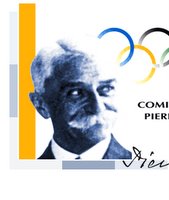Who invented the Modern Olympic Games?
 Baron Pierre de Coubertin (January 1, 1863-September 2, 1937), born as Pierre de Frédy, was a French pedagogue and historian, but is best known as the founder of the modern Olympic Games.
Baron Pierre de Coubertin (January 1, 1863-September 2, 1937), born as Pierre de Frédy, was a French pedagogue and historian, but is best known as the founder of the modern Olympic Games.Born in Paris into an aristocratic family, De Coubertin was inspired by his visits to British and American colleges and universities, and set out to improve education. He thought part of this improvement should be sports education, which he considered an important part of the personal development of young people.
He conceived of an international competition to promote athletics. A growing international interest in the ancient Olympics, fed by recent archaeological finds at Olympia, De Coubertin devised a plan to revive the Olympic Games.
To publicize these plans, he organised an international congress on June 23, 1894 at the Sorbonne in Paris. There he proposed to reinstate the ancient Olympic Games. The congress led to the establishing of the International Olympic Committee (IOC), of which De Coubertin became the general secretary. It was also decided that the first modern Olympics would take place in Athens, Greece and that they would be held every four years. These Games proved a success, and De Coubertin took over the IOC presidency when Demetrius Vikelas stepped down after the Olympics in his own country.
Despite the initial success, the Olympic Movement faced hard times, as the 1900 (in De Coubertin's own Paris) and 1904 Games were both swallowed by international fairs, and received little attention.
This changed for the better after the 1906 Summer Olympics, and the Olympic Games grew to become the most important sports event. De Coubertin stepped down from his IOC presidency after the 1924 Olympics in Paris, which proved much more successful than the first attempt in that city in 1900. He was succeeded as president by Belgian Henri de Baillet-Latour.
De Coubertin remained Honorary President of the IOC until he died in 1937 in Geneva, Switzerland. He was buried in Lausanne (the seat of the IOC), although his heart was buried separately in a monument near the ruins of ancient Olympia.
Pierre de Coubertin Awards
The Awards are an initiative of the Australian Olympic Committee and formed an integral component of the NSW Olympic Schools Strategy in the lead up to the Sydney Olympic Games. The Awards recognise Australian senior secondary students who demonstrate attributes consistent with the fundamental aims of the Olympic Movement through participation in physical and athletic activities.
All secondary schools are invited to nominate one recipient for the Pierre de Coubertin award each year. Past recipients of the award include a number of former and current Olympians: 1996 recipients Jade Winter attended the 1996 Atlanta Olympics in Swimming and Ashley Callus participated in Sydney 2000 Swimming; 1998 winner Angie Skirving represented in Hockey at Sydney, while 2000 recipient Damian
Istria (St Josephs College) represented Gymnastics at Sydney in the same year.
Receive post updates by Email



























 Add my feed to your Rss
Add my feed to your Rss
